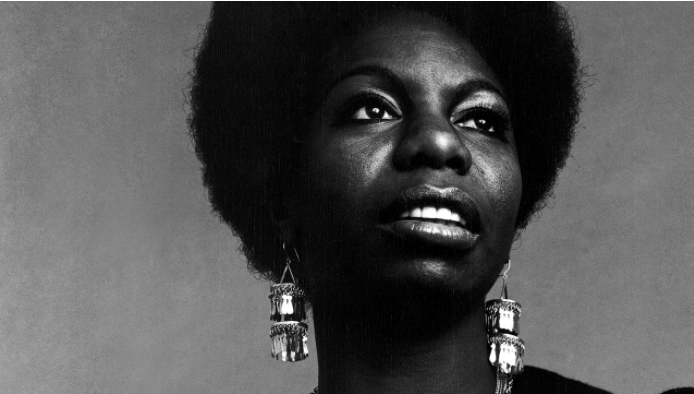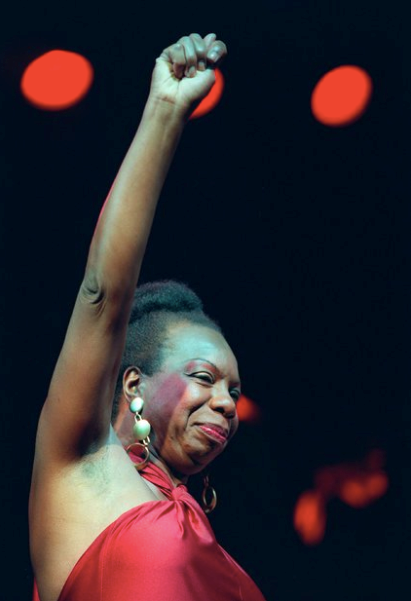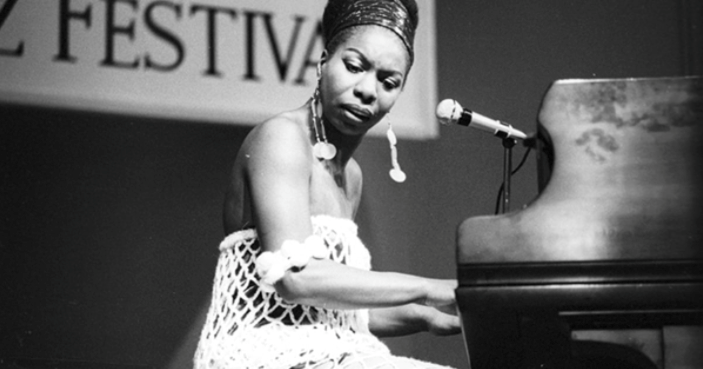 Nina SimoneNetflix Documentary: What Happened, Miss Simone?The sixties were an excruciatingly hard time to be an African American, especially an African American woman. Nina Simone was African American and a woman who spoke and sang out against the injustices of being an African American in the United States. She was a hero in the fight for racial equality in the sixties and her legacy is still affecting us today. Simone is a an exemplary hero because she is courageous, creative, and resilient, making her actions affect us decades later.
Nina SimoneNetflix Documentary: What Happened, Miss Simone?The sixties were an excruciatingly hard time to be an African American, especially an African American woman. Nina Simone was African American and a woman who spoke and sang out against the injustices of being an African American in the United States. She was a hero in the fight for racial equality in the sixties and her legacy is still affecting us today. Simone is a an exemplary hero because she is courageous, creative, and resilient, making her actions affect us decades later.
In creating and performing her gutsy and daring songs, Simone showed determination and courage. Simone once said, “I choose to reflect the times and the situations in which I find myself that to me is my beauty and at this crucial time when everything is so desperate when every day is a matter of survival, you can’t help but be involved.” This showed how she truly was and is a real hero. She saw people in the same struggle she was in, being discriminated against, disrespected, and just being shown pure hatred for just being alive and spoke and sang out about it. To Simone, it seemed harder not to speak out against the plight that her people were going through. This is still important in the twentieth century, though. The courage she showed should be inspiring others to speak out against all of the injustice in the world. One of her most influential quotes that showed her dedication to creating change in a time where change seemed impossible, she said, “I don’t mind going to sleep without food or sleep as long as I am doing something worthwhile to me such as this.”
In creating these bold songs that were aimed at a creating a better world, Simone was extremely innovative, not only in the way she wrote them but also in the way she presented her ideas and feelings and in the diversity of her songs. She was really unlike anyone else in her time and when people tried to compare her to Billie Holiday (another African American woman who sang about injustice in the sixties) she would be furious claiming that they are styles were completely different. She wrote her songs in many different styles which was shown through different genres. She wrote jazz songs that were more peaceful and nicer to the ear like “I Wish I Knew How It Would Feel to Be Free” and “Why (The King Of Love Is Dead).” This way people would be able to listen to the songs and be spreading the message but without necessarily realizing it since they had a much more positive tune than their massage. Yet she also wrote blues songs that were angry and showed how fed up she was with the inequality in the world, songs like “Mississippi Goddam” and “Backlash Blues.” In these songs, you could hear the anger for how she and her people have been treated, making it impossible not to hear the message. She also had a select few positive songs like “Young, Gifted, and Black,” songs like this showed a positive outlook for the future. Simone also wrote and covered songs that left you feeling haunted like “Four Women” and “Strange Fruit.” They showed the pain in the people that were being discriminated against, these songs are hard to listen to because in her creative way of showing her feelings through varied ideas and sounds. Her creativity has outlasted her, there are still artists now who are inspired by her creativity. Kanye West uses parts her songs in his current songs and reaches a broad audience with her music half a century after they were made. In his newest album The Life of Pablo, West uses a part of Simone’s “Do What You Gotta Do” in one of his most popular songs that created endless controversy, “Famous.” Simone’s powerful songs are still being used to show ideas that are not necessarily normal and her songs are still making people talk. He also used her cover of the song “Strange Fruit” in his song “Blood On The Leaves” which talks about social injustices today. Nina Simone making her music in many different ways with different messages made it outlast her and have her message reach a bigger audience.
 Nina SimoneBertrand GuayReaching a large audience was key to another hero characteristic of hers, resilience. She had to fight to do everything she could do to bring everyone's attention to the issue of race in America in the sixties. Not only did she make music but she went on marches, some with Martin Luther King Jr., she even sang at and during some of the marches. She had to do things besides music because, while she was able to bounce back from most things, there were some things she could not do anything about. Simone's music got banned in the South, her target audience, and since her music could not make as much of an effect there she went on the marches to get her opinion on the racial injustices in America out in the open. Playing political songs caused some people to stop listening to her music altogether. This made it hard for her to make money to support herself. She spoke on the ban on her music and how these songs affected her saying, “I would not change being part of the civil rights movement, I would not change that, but some of the songs I sang have hurt my career. All of the controversial songs the industry decided to punish me for and they put a boycott on my records.” Playing these political songs made it difficult for her to get gigs as well, since people did not want the controversy associated with them. People were too scared to get involved with the courageous battle she was fighting. Simone’s resilience was the reason she was able to make a difference and help the fight for racial equality in America. She is an inspiration to people who feel as though they are actively being stopped by others on their mission for a better world.
Nina SimoneBertrand GuayReaching a large audience was key to another hero characteristic of hers, resilience. She had to fight to do everything she could do to bring everyone's attention to the issue of race in America in the sixties. Not only did she make music but she went on marches, some with Martin Luther King Jr., she even sang at and during some of the marches. She had to do things besides music because, while she was able to bounce back from most things, there were some things she could not do anything about. Simone's music got banned in the South, her target audience, and since her music could not make as much of an effect there she went on the marches to get her opinion on the racial injustices in America out in the open. Playing political songs caused some people to stop listening to her music altogether. This made it hard for her to make money to support herself. She spoke on the ban on her music and how these songs affected her saying, “I would not change being part of the civil rights movement, I would not change that, but some of the songs I sang have hurt my career. All of the controversial songs the industry decided to punish me for and they put a boycott on my records.” Playing these political songs made it difficult for her to get gigs as well, since people did not want the controversy associated with them. People were too scared to get involved with the courageous battle she was fighting. Simone’s resilience was the reason she was able to make a difference and help the fight for racial equality in America. She is an inspiration to people who feel as though they are actively being stopped by others on their mission for a better world.
Simone is a an exemplary hero because she is courageous, creative, and resilient, making her actions affect us decades later. Nina Simone was a strong, empowered woman who was not going to settle for what some think is unobtainable; racial equality. She worked hard and broke many barriers, making her work for equality outlast her and affect us in the twenty-first century decades later.
Works Citied
Copi, Tom “Nina Simone.” Rolling Stone, Nick Murray, 18 Nov. 2014,www.rollingstone.com/music/premieres/nick-cave-nina-simone-20000-days-on-earth-20141118.
Feldstein, Ruth. ""I Don't Trust You Anymore": Nina Simone, Culture, and Black Activism in the 1960s." "I Don't Trust You Anymore": Nina Simone, Culture, and Black Activism in the 1960s. The Journal of American History, Mar. 2005. Web. 03 Jan. 2017.
Guay, Bertrand. “Nina Simone, the Subject of a 2015 Documentary, Received Her First Nomination to the Rock Hall This Year.” New York Times, Joe Coscarelli, 5 Oct. 2017, www.nytimes.com/2017/10/05/arts/music/radiohead-nina-simone-kate-bush-nominees-rock-roll-hall-fame.html.
Johnson, John H. "Nina Simone Reveals: 'Mississippi Goddam' Song 'Hurt My Career'." Jet 24 Mar. 1986: 54-55. Google. Web. 16 Jan. 2017.
Kanye West “Blood On The Leaves,” Yeezus, Def Jam Recordings, 2013
Kanye West “Famous.” The Life Of Pablo, GOOD Music, 2016
Nina Simone “Do What You Gotta Do.” Nuff Said!, RCA Victor, 1968
Nina Simone “Four Women.” Wild Is The Wind, Philips Records, 1966
Nina Simone “I Wish I Knew How It Would Feel To Be Free.” Silk & Soul, RCA Victor, 1967
Nina Simone “Mississippi Goddam.” Nina Simone in Concert, Philips Records, 1964
Nina Simone “Strange Fruit.” Pastel Blues, Philips Records, 1965
Nina Simone “To Be Young, Gifted, and Black.” Black Gold, RCA Victor, 1970
“Nina Simone: ‘What Happened, Miss Simone?’” Medium, Women and Hollywood, 20 Dec. 2016, blog.womenandhollywood.com/nina-simone-to-receive-the-recording-academys-lifetime-achievement-award-6010f6a61094.
Nina Simone “Why (The King of Love Is Dead).” ‘Nuff Said!, RCA Victor, 1968
Simone, Nina. "Freedom." Interview. Youtube. The Estate of Nina Simone, 16 Feb. 2013. Web. 1 Feb. 2017. Except from Nina: An Historical Perspective by Peter Rodis
Simone, Nina. Interview. Youtube. The Wire, 26 Feb. 2013. Web. 31 Jan. 2017.
Simone, Nina. Interview by Mavis Nicholson. Youtube. N.p., 5 Feb. 2013. Web. 31 Jan. 2017.
Simone, Nina. Interview by Tim Sebastian. Youtube. BBC, 18 May 2010. Web. 31 Jan. 2017.
Simone, Nina, and Stephen Cleary. I Put a Spell on You: The Autobiography of Nina Simone. New York: Pantheon, 1991. Print.
Simone, Nina. "That Blackness." Interview. Youtube. The Estate of Nina Simone, 4 Feb. 2013. Web. 31 Jan. 2017.
Smith, Ian K. "Top 20 Political Songs: Mississippi Goddam | Nina Simone | 1964." Top 20 Political Songs: Mississippi Goddam | Nina Simone | 1964. New Statesman, 25 Mar. 2010. Web. 03 Jan. 2017.
What Happened, Miss Simone?. Dir. Liz Garbus. Netflix, 2015. Documentary.
 Nina SimoneTom Copi
Nina SimoneTom Copi
Page created on 1/10/2018 2:55:34 PM
Last edited 1/12/2025 5:25:55 PM
